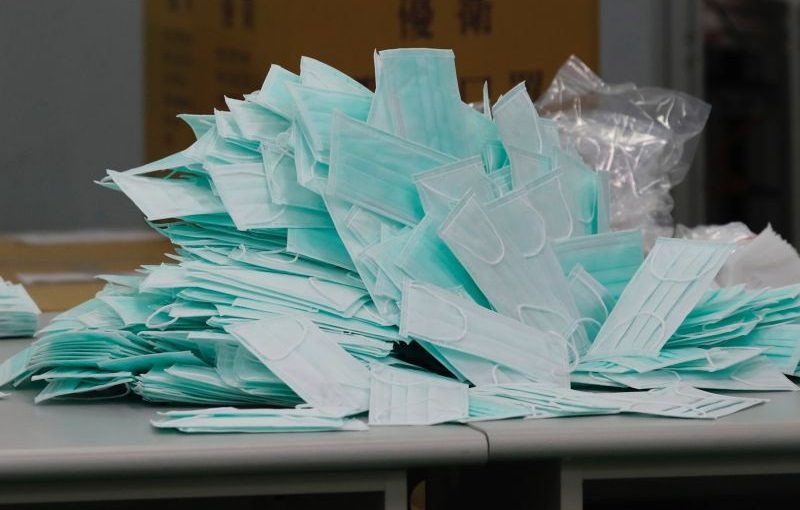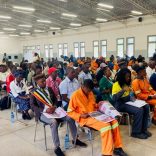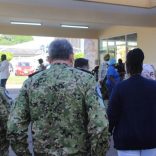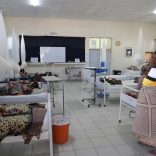Mozambique: Mozal awards 150 scholarships for university, technical and vocational education
Not enough equipment: MISAU incapable of protecting health professionals – OSC

FILE PHOTO: For illustration purposes only. [File photo: Lusa]
Despite receiving over US$100 million for prevention and treatment of the pandemic, Mozambique’s Ministry of Health (MISAU) does not have enough Covid-19 protection equipment (PPE) for its staff.
This has contributed to over 1,500 health professionals becoming infected, 375 of them at Maputo Central Hospital (HCM), the country’s largest health unit, and happens after the Mozambican executive received US$109 million from its national and international partners, an amount exceeding the US$100 million it initially asked for.
According to a document entitled “Status of Commitments with Partners under Covid-19: October”, the US$109,569,978 earmarked for the prevention and treatment of Covid-19 were all channelled to MISAU. But HCM health professionals speaking to Mozambique’s Citizens’ Health Observatory (OCS) complain about the lack of PPE at work, rendering their activities risky.
In the hospital’s maternity ward, technicians have been working with only two masks per week and without protection aprons. “Yesterday (Tuesday), we had two patients infected by the disease, and, naturally, we are exposed, since we do not have adequate protective equipment,” one female nurse reported, anonymously.
In another ward at the same hospital, health professionals get only 12 pairs of gloves per day, and are forced to work with the same pair all day, placing their lives and thousands of others at risk. “We’re not fine here. (Occasionally) we are sent to do check-ups, but when we get there, we’re told there are no tests,” she added.
Ideally, there should be 50 pairs of gloves per team per day. It is suspected that the shortfall has contributed to the contagion of the health professionals, as well as their relatives, since the HCM does not carry out contact tracing on the health professionals’ relatives.
Recently, Joana Alberto*, a nurse at HCM, started feeling tired. Her joints, and indeed her whole body, were hurting, and she desperately wanted to rest.
“But it was during work hours and I couldn’t rest. The days are long and there are lots of patients to care for. How could I think about resting?” she asked. But Alberto did not know what was happening; she thought that the pain was related to the long hours of work and at no time did she relate it to Covid-19.
Other colleagues had similar symptoms, commenting about the fatigue and the pain they felt. But those who were stronger helped the others.
“What we really want is for this moment to pass quickly or for people to be more cautious. We are suffering here and not even the subsidies are important. (Government and the health professionals negotiated a subsidy for the risk faced by the workers at the forefront of Covid-19.) Our lives are at stake. We work 24 hours a day and we have one or two days off, but they are not enough. It’s hard, because it’s 24 hours of non-stop work.”
With night came with breathing difficulties. Never before had she felt such symptoms. “Later we were submitted to Covid-19 testing. They called me when I was home resting to inform me that I had tested positive.”
After the call, she followed all prevention measures to protect her family. “I didn’t want to see them with the same symptoms. The symptoms are painful and I can’t imagine someone else with them. At a certain point the concern is with those closest to us. But it was clear that the authorities are not concerned with us. They didn’t even bother testing my family.”
Francisco, a general nurse, is not in the frontline of the fight against Covid-19, but he twice tested positive in his ward. With searing headaches and fatigue, he feared for the lives of thousands of Mozambicans who do not take the disease seriously, and calls for them to comply with prevention measures.
“Nobody is taking the disease seriously, and the only thing that I know is that, if things continue this way, things will end up badly for everyone,” he complains.
Although he does not know where exactly he got infected, he is sure that it was at the HCM. “At work, sometimes I’m all alone, and I did not wear a mask for one day. I believe it was on that day. A colleague’s test had come back positive and he had already left. Perhaps it was then,” he said.
He added that one of the major problems he faced has to do with stigma. “I’m a nurse and I’m very sensible. When I found out I had been infected, I asked people not to get close to me since I was infected. But people started spreading this information in my neighbourhood and I felt very bad,” he complained.
According to health professionals, MISAU is ignoring staff who are not on the front line by not providing them with PPE, even though they diagnosis cases and identify patients with Covid-19, telling them to get tested.
“We’re the ones who triage the patients. We send them for testing but we don’t have protection equipment. We’re exposed,” another nurse requesting anonymity for fear of reprisals said.
One thing that is a travesty is that neither hand-washing nor temperature-taking are obligatory at the HCM. Guards at the entrance enforce neither measure, potentially transforming the health unit in a vector of Covid-19 contagion.
The distance between places where temperatures are taken and where the taps are is quite considerable, which might be another reason why patients do not wash their hands. In truth, the blame is shared by both professional workers and patients.
- Joana Alberto is a fictitious name. The source is female and sought anonymity.













Leave a Reply
Be the First to Comment!
You must be logged in to post a comment.
You must be logged in to post a comment.